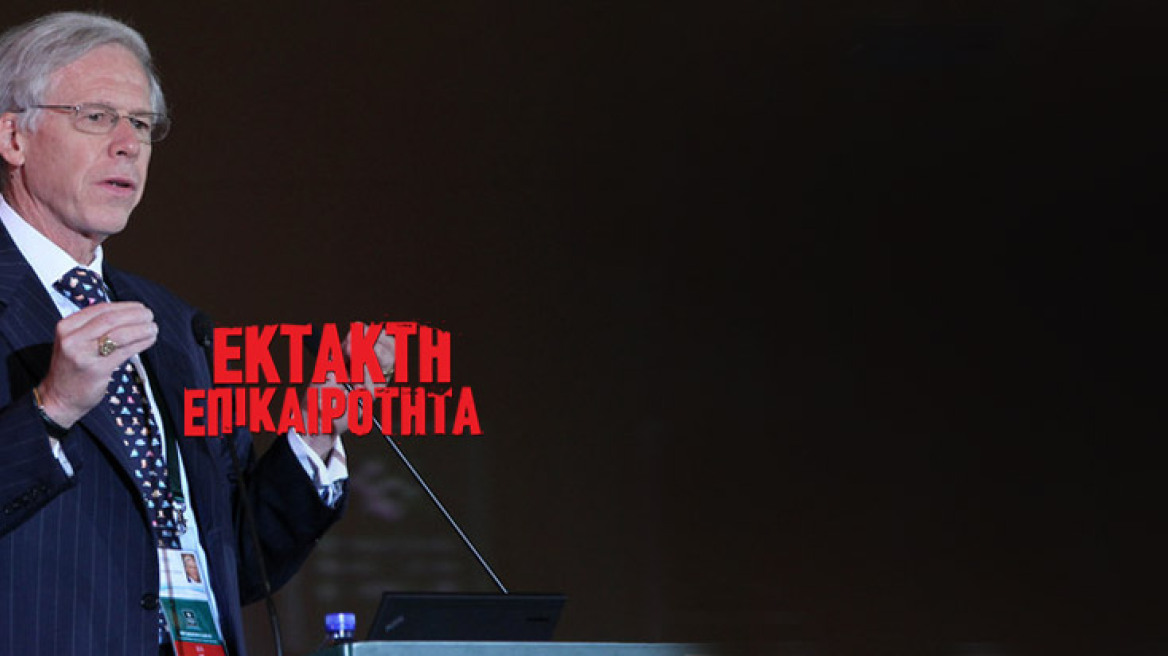
Papademos-Dallara deliberating for over 3 hours
Papademos-Dallara deliberating for over 3 hours
The meeting between Prime Minister Lucas Papademos and the head of the International Monetary Institute (IIF), Charles Dallara, lasted for more than three and a half hours...

UPD:
The meeting between Prime Minister Lucas Papademos and the head of the International Monetary Institute (IIF), Charles Dallara, lasted for more than three and a half hours, in yet another round of marathon deliberations on the restructuring program of the Greek debt.
The climate which seems to prevail after all these latest negotiations is one of cautious optimism that we will ultimately achieve the bond exchange program for Greece. As was also stressed by Finance Minister Evangelos Venizelos, talks will continue in the next few hours, something which was confirmed by an official IIF announcement.
The heads of two Greek banks are also optimistic, as they are convinced that the agreement is a matter of a few days since, as they state, if it is not completed then Europe will face a major issue.
According to banking sources in Athens and London, what sparked enormous concern to the German Chancellery and the French Presidency was the rise of Portuguese spreads to 15%. Angela Merkel and Nicolas Sarkozy spoke to IIF head Charles Dallara, demanding an immediate solution to the completion of the Greek PSI.
Bankers are now allegedly prepared to accept the proposed rate of 4% recommended by the Greek government and the new bonds will have a maturity of 30 years. Dow Jones Newswires mentions that what Greek government officials are negotiating with representatives of private creditors is a lower coupon, from 3% to 4.5% of the new bonds.
In each case there is optimism that progress is being made and the goal is to conclude negotiations by the end of the week.
The climate which seems to prevail after all these latest negotiations is one of cautious optimism that we will ultimately achieve the bond exchange program for Greece. As was also stressed by Finance Minister Evangelos Venizelos, talks will continue in the next few hours, something which was confirmed by an official IIF announcement.
The heads of two Greek banks are also optimistic, as they are convinced that the agreement is a matter of a few days since, as they state, if it is not completed then Europe will face a major issue.
According to banking sources in Athens and London, what sparked enormous concern to the German Chancellery and the French Presidency was the rise of Portuguese spreads to 15%. Angela Merkel and Nicolas Sarkozy spoke to IIF head Charles Dallara, demanding an immediate solution to the completion of the Greek PSI.
Bankers are now allegedly prepared to accept the proposed rate of 4% recommended by the Greek government and the new bonds will have a maturity of 30 years. Dow Jones Newswires mentions that what Greek government officials are negotiating with representatives of private creditors is a lower coupon, from 3% to 4.5% of the new bonds.
In each case there is optimism that progress is being made and the goal is to conclude negotiations by the end of the week.
Indicative is the news from Reuters under the heading "Possible bankruptcy of Greece without causing turmoil in the markets" ...
At the same time, however, many analysts appear pessimistic regarding the likelihood of a positive outcome of the critical negotiations on the Greek debt restructuring, not only as to reaching an agreement as such, but - and especially - in relation to its effectiveness, even though it was "set" on the basis of the agreement of 26/27 October.
Bloomberg, which for the umpteenth day in a row is working closely on the case, accommodates the assessment of Mr Paul Donovan, financial analyst at UBS Swiss, who says he expects a complete collapse of Greece, considering that participation in the PSI will not be voluntary.
Characteristically he said, "there will be default in Greece, with a full activation of CDS, and problems in finding a lender who will accept a haircut at 68% - as promoted in practice - when the agreement on the PSI is involuntary."
At the same time Mr. Hans Rodeker, chief investment strategist at Morgan Stanley, says that even with a private sector participation of 90%, Greece will not be able to accomplish the goal of reducing the deficit to 120% of the GDP and stressed that at best the most optimistic scenario for our country at this stage of negotiations, is to extend the participation in the PSI to 75%, something which is just not enough ...
A similar estimate is made by Mr. Patrick Armstrong, an official of Armstrong Investments, who predicted that "the PSI is not going to even get close to 90% - a rate which would have had to reduce the debt in Greece to 120% of the GDP within a decade. "
At the same time, however, many analysts appear pessimistic regarding the likelihood of a positive outcome of the critical negotiations on the Greek debt restructuring, not only as to reaching an agreement as such, but - and especially - in relation to its effectiveness, even though it was "set" on the basis of the agreement of 26/27 October.
Bloomberg, which for the umpteenth day in a row is working closely on the case, accommodates the assessment of Mr Paul Donovan, financial analyst at UBS Swiss, who says he expects a complete collapse of Greece, considering that participation in the PSI will not be voluntary.
Characteristically he said, "there will be default in Greece, with a full activation of CDS, and problems in finding a lender who will accept a haircut at 68% - as promoted in practice - when the agreement on the PSI is involuntary."
At the same time Mr. Hans Rodeker, chief investment strategist at Morgan Stanley, says that even with a private sector participation of 90%, Greece will not be able to accomplish the goal of reducing the deficit to 120% of the GDP and stressed that at best the most optimistic scenario for our country at this stage of negotiations, is to extend the participation in the PSI to 75%, something which is just not enough ...
A similar estimate is made by Mr. Patrick Armstrong, an official of Armstrong Investments, who predicted that "the PSI is not going to even get close to 90% - a rate which would have had to reduce the debt in Greece to 120% of the GDP within a decade. "
UPD:
Ακολουθήστε το protothema.gr στο Google News και μάθετε πρώτοι όλες τις ειδήσεις
Δείτε όλες τις τελευταίες Ειδήσεις από την Ελλάδα και τον Κόσμο, τη στιγμή που συμβαίνουν, στο Protothema.gr
Δείτε όλες τις τελευταίες Ειδήσεις από την Ελλάδα και τον Κόσμο, τη στιγμή που συμβαίνουν, στο Protothema.gr
ΡΟΗ ΕΙΔΗΣΕΩΝ
Ειδήσεις
Δημοφιλή
Σχολιασμένα






































